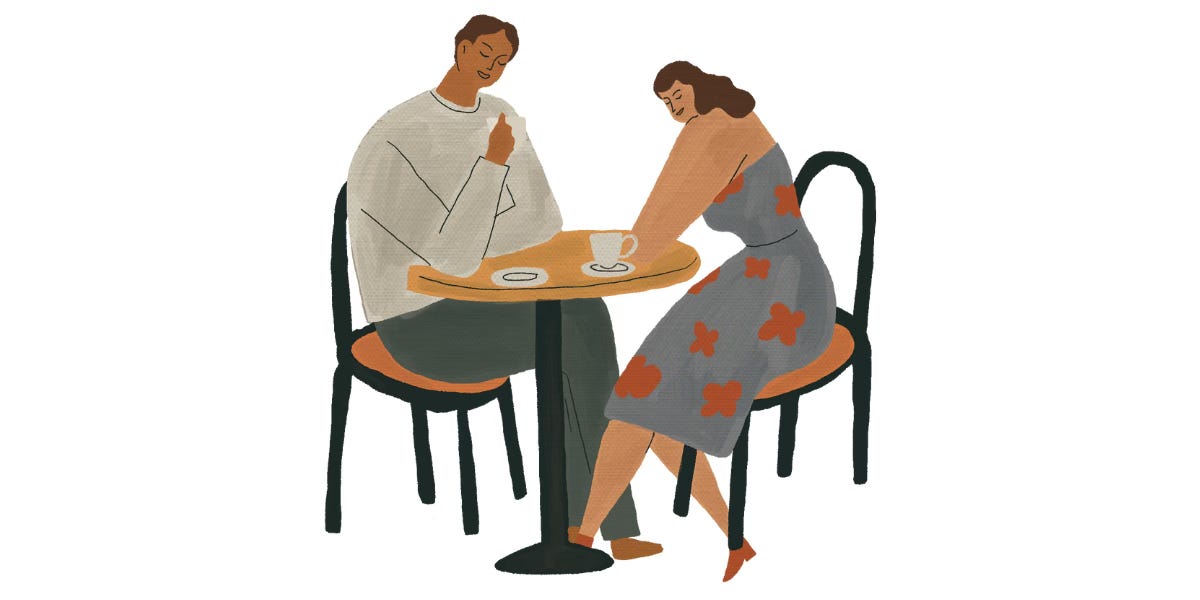First Dates
Last week, I did an interview with BBC; we discussed first dates. My hot take …
don’t do dinner on a first date, it’s the worst idea ever.
The last time I went on a first date was in 2009. It was with this guy (now, my husband) who I’d chatted with occasionally on the internet for two years.
My biggest concern before we met was our in-person chemistry not living up to our virtual interaction. I can’t quite remember why we chose to meet and put “beat” in Gandhi Bazaar (one of our favourite neighbourhoods in Bangalore) instead of meeting for a drink or a meal.
But that one decision changed our lives forever (in a good way).
This can go in three ways now - first, a no, a definite no. Second, yes. Full yes. Third, yes, but not yet. This offers scope to put more meets, learn about each others’ funny faces, food tastes, smells, sense of humour, dressing, etc. Finally, you'll end up in love; maybe not the gut churning romantic variety like a unit function, out of nowhere. Instead, something sustainable like a step function built on affection, tolerance, enjoying each others’ company, comfort, care, etc. If it were to ever fall apart then it would be one step at a time and hopefully, less painful.
(my journal entry after the date, from 2009)
What was fantastic about this date was that both of us came out with a sense of longing, wanting to do this again. I’ve realised that wanting to meet/ talk again is a good enough signal at this stage of a relationship.
You almost never feel like you want to spend the rest of your life with someone on a first date. Humans have not evolved to make such long-term decisions.
I realise job interviews are similar to first dates.
Recently, I was speaking to someone about a potential work opportunity, and I came out of the conversation with a very clear sense of whether I wanted to pursue it or not.
That’s when I realised that I usually have great instincts about these things. However, I’ve not always been able to acknowledge or pay it any heed. Growing up in a society that relies heavily on data or evidence, it’s been a constant internal struggle to follow my instincts.
Unfortunately, these signals or intuitions are amorphous and fleeting, so you tend to miss them altogether. Based on my recent interaction, I figured that I can break down my intuition into more familiar attributes such as …
Comfort
Talking to strangers is an inherently uncomfortable experience. But over the length of any conversation, your level of discomfort changes in one of three ways - increase, stay as is or reduce (even swinging towards happiness).
If you remain in a heightened state of discomfort or feel worse through the interaction, it means that between the two of you, you weren’t able to break ice. This can happen for variety of reasons - both of you are introverts, both of you had bad days or there simply wasn’t any chemistry.
There’s no way to ascertain the reasons for sure. What’s a fact is the reading on your discomfort scale. You feel it in your body, there’s no denying it.
Duration
While articulating his general theory of relativity, Einstein said, “sit with a pretty girl for an hour, and it feels like a minute; sit on a hot stove for a minute and it feels like many hours”. The same goes for a good conversation.
You don’t notice time fly, and you’ll end up speaking for much longer than intended. At the end, you’ll both be left wanting. With a terrible conversation, at least one of you will manage to pull the cord on time, or well within.
Response rate
You remember the last scene in Harry met Sally?
“when you realise you want to spend the rest of your life with somebody, you want the rest of your life to start as soon as possible”
As I’ve said before, you cannot humanly make such life-long decisions. At best, it means, I’d definitely like to see you again.
But the important point is that these decisions are almost always made immediately. So, when someone “takes time”, it’s a signal, not noise.
Fundamentally, we’re not good at saying NO.
That’s why we have bots to reject applicants, and technology to ghost partners. Again, you may attribute the slower response rate, or the lack of it to people being busy or dead, but there’s no way to ascertain the truth.
Their time to respond remains a fact.
Remember, a conversation is a dance between two individuals. No one person can make or break it.
At the end of a conversation, you may be left feeling lousy, replaying your answers, nitpicking on things you said and so on, but let me assure you that your instincts don’t lay in isolation; they are intertwined with the other person’s too.
P.S. I’ve set people up on interesting first dates that resulted in definite seconds (if not, marriages), but I was convinced that how you meet matters when I saw 40% of first dates resulting in seconds on Dinner Club.
